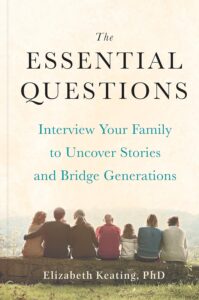
The Essential Questions: Interview Your Family to Uncover Stories and Bridge Generations by Elizabeth Keating Ph.D.
Just as the oral histories of people around the world are disappearing amid rapid change, there is a risk that your family’s personal stories, too, will be lost forever. In The Essential Questions, anthropologist Elizabeth Keating helps you to uncover the unique memories of your parents and grandparents and to create lasting connection with them in the process.
As you seek to learn more about your family history, how do you get beyond familiar anecdotes and avoid the frustration of oppositional generational attitudes? By asking questions that make the familiar strange, anthropologists are able to see entirely different perspectives and understand new cultures. Drawing on her lifelong work in this field, Keating has developed a set of questions that treat your parents and grandparents not just as the people who raised you, but as individuals of a certain society and time, and as the children, teenagers, and young adults they once were. The Essential Questions helps you to learn about the history of your elders, to see the world through their eyes, and to honor the language they choose to describe their experiences.
Here are some summary notes from the podcast interview:
Elizabeth Keating is an anthropology professor and author of the new book “The Essential Questions: Interview Your Family to Uncover Stories and Bridge Generations.”
The book provides a framework of questions to deeply interview older family members about their life experiences and get intergenerational perspectives.
Keating was inspired to write the book after losing her mother and realizing how little she knew about her life outside being a parent.
The 13 essential questions focus on topics like childhood homes, interactions, coming-of-age rituals, fears, and more. They elicit rich details and stories.
Interviewing family creates empathy, brings unknown histories to light, builds closer bonds, and preserves ordinary details of past eras before they are lost.
Tips covered include withholding judgment, letting subjects guide the narrative, listening without interrupting, allowing silences for more memories to emerge.
Recording interviews is highly recommended to accurately capture details, language, and stories for family archives. Video may make some uncomfortable.
Starting interviews sooner rather than later is best, even if dementia is present, as older memories persist. Conversations can unfold over time.
Understanding parents as full individuals, not just in their parental role, brings gratitude and a richer sense of personal history and influences.
Podcast: Play in new window | Download (Duration: 49:12 — 33.8MB) | Embed
Subscribe: Apple Podcasts | Spotify | Amazon Music | Pandora | iHeartRadio | Podchaser | TuneIn | Deezer | RSS | Subscribe Links






